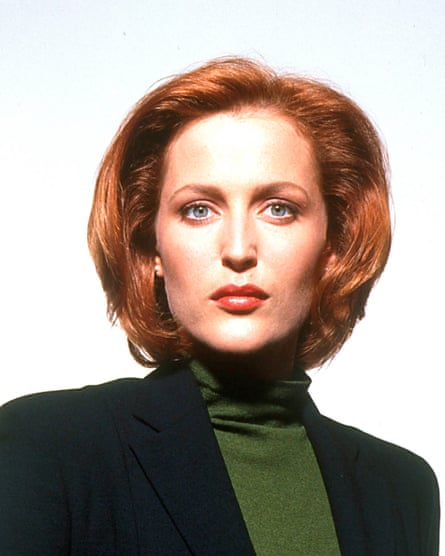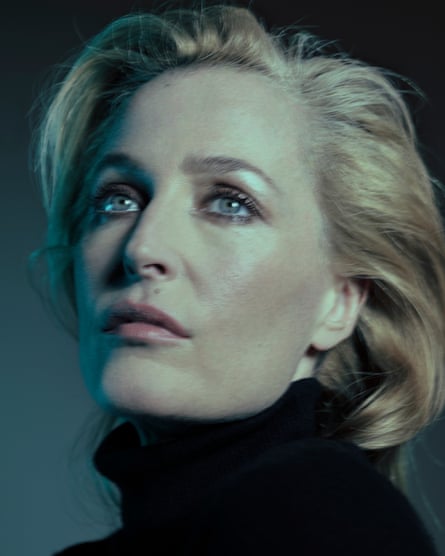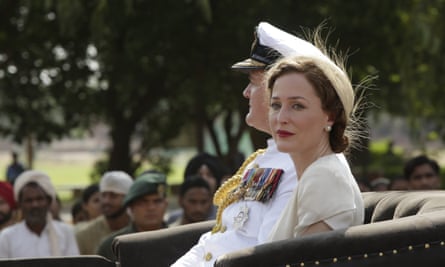 |
| Gillian Anderson |
Gillian Anderson: ‘There were times when life was really bad’
The actor formerly known as Dana Scully is now a self-help guru. How did she beat self-doubt and her ‘intolerant’ inner voice?
Decca Aitkenhead
Saturday 11 March 2017
The history of India’s independence and the creation of Pakistan had been unfamiliar to Gillian Anderson when she took the role of Lady Mountbatten for her new film Viceroy’s House. The actor had once hired a private history tutor, a dozen years ago, to fill in some gaps of history she was hazy on – “Stuff that just wasn’t in my brain” – but this had not been one of them.
“No, I’d thought let me start with a couple of things that I don’t actually know that much about, or I can’t remember that much about, which was the first and second world wars.” She starts to laugh. “But it was a disaster. Because I have no memory. I took notes, blah, blah, blah, but couldn’t remember a thing he taught me. Nothing. I’m not even sure, if you’d asked me the next day, I could have told you what I’d learned. You know, even my favourite books, I couldn’t tell you what they were about. It’s always been that way.”
 |
| Gillian Anderson: ‘I have to constantly settle myself down from the state of being aggravated.’ Photograph: Nadav Kander/The Guardian |
The menopause hasn’t helped, and lately things have become so bad that she’s going to get herself tested to see if she might actually be dyslexic. “Somebody had said to me that dyslexia isn’t just about seeing words backwards, it’s also about the assimilation of information. I’d always been afraid to look into it, because I was afraid that if I found something out, I would think that I couldn’t do anything that I wanted to do. I have this impression that I can do whatever I make up my mind to. But the reality is...” She lets the sentence fall away with a grimace.
By a bit of luck, the one thing the actor has always been able to remember are her lines. “But of course that’s terrifying for me, thinking, well, what if this problem that exists in the rest of my life shows up in that respect, too? Then I’d be buggered.”
If this creates an impression of a ditzy blonde, it would be misleading. We meet at the photographer’s studio, where a rack of stylist’s clothes stands unused; she chooses to be photographed in her own, and the way she chuckles about this makes me think the preference is par for the course for Anderson on shoots. Her fitted black trouser suit and heels are a sort of corporate/fashion hybrid, and her manner is similarly friendly but business-like. Apart from her enormous eyes, everything about Anderson is tiny, and the compactness reinforces the sense of efficient self-possession she conveys. She was just 24 when, as FBI agent Dana Scully in the paranormal TV drama that would make her a global star, she captivated X-Files fans for 10 years with her hyper-rational cool, before moving to London where her career has been equally sure-footed. From period dramas (Bleak House, House Of Mirth, War And Peace) to big-budget TV series (Hannibal, The Fall), to independent movies (The Last King Of Scotland, A Cock And Bull Story), comedy (Boogie Woogie, Johnny English Reborn) and theatre (A Doll’s House, A Streetcar Named Desire), Anderson seems to get busier the older she gets. It’s a tall order for a beautiful blonde to play consistently powerful, intelligent women, but Anderson has pulled it off.

As Scully in The X-FilesThe actor brings her air of serious purpose to the role of Lady Mountbatten, giving us a less flighty version of the aristocrat than the good-time girl caricature we’ve been accustomed to. She evokes her character’s classic colonial glamour, but depicts her dashing about nursing the sick and injured, and being a generally good egg.
“One of the things that I was surprised by in studying Edwina was that there was certainly a turning point in her life when she went from being predominantly a socialite, and wafting around and having affairs, living pretty much from holiday to holiday and leaving her children at home. But when the war happened and she started to participate in nursing et cetera, her escapism completely switched over to being of service, so everything she did from that moment on was about properly digging in and working around the clock.”
Viceroy’s House opens with the arrival in India of Lord Mountbatten and his wife in 1947, to oversee the nation’s transition from colonial rule to independence. Hugh Bonneville plays Edwina’s husband, and their official residence – Viceroy’s House – is not so much the film’s setting as the third star member of the cast. Sumptuously filmed, at moments the movie is a sort of Downton Abbey of the Raj, with all sorts of romantic intrigue going on below stairs among the 500 Hindu, Sikh and Muslim household staff. But there is not so much as a hint of the affair Lady Mountbatten was rumoured to take up with the man about to become India’s first prime minister, Jawaharlal Nehru. Their romance was to have been the subject of a 2009 film, Indian Summer, until the Indian government took exception to the salacious storyline and forced the movie to be cancelled. In the hands of British director Gurinder Chadha, whose own family were among the 14 million displaced in the violence and bloodshed of the period, this new version of India’s independence is less racy, if rather more substantial, and concerns itself with the politics of partition.
Anderson says she was always conscious while making the film that some viewers will find the concept of a “good” colonialist inherently problematic – “yes, absolutely, absolutely” – and 70 years after independence, she found herself revisiting colonialism’s dynamics on location. They filmed in Jodhpur, staying at the Umaid Bhawan Palace hotel, where the film was also shot, using the palace to double for the real Viceroy’s House. “And, you know, we’re in a situation where we’re in a developing country and we are filming at the height of luxury and, yes, there’s an uneasiness to it. There was one actor we worked with, who does a lot of work around the world in – I can’t remember whether it’s around poverty or Aids – who would not stay there. He refused to stay in the hotel, and wanted to stay in some place that felt more like India.”
Even by the standards of activist actors, Anderson’s own involvement in social and political causes is prolific. The 48-year-old has campaigned variously for women’s rights in Afghanistan, against sexual violence towards girls in Myanmar, for better access to HIV treatment in South Africa and education in Uganda, against domestic violence in the UK and child trafficking across the globe, for the rights of indigenous tribes in South America and conservation of cheetahs in Namibia, against deforestation in the Amazon and rabbit fur farms in China – and that is nothing like the full list. I was therefore expecting her to be quite forthright about current political affairs, but am completely wrong.“I generally have a tendency to steer away from outright political discussion in interviews, because I am an actor, and there’s so much that I don’t understand, and I don’t for a second feel like I have a right to that platform. I don’t want to get into a discussion about Trump or about Brexit or any of that – I feel it’s best left to people who really understand the very, very complex issues. Not for a second am I going to pitch in, because I don’t really know what it is that I’m talking about. I have opinions, but I don’t think my opinions are more valid because I’m an actor and have more of a platform than others.”
I wonder if this is her way of saying she shares the view that actors ought to stop turning awards ceremonies into anti-Trump rallies, but she looks faintly alarmed. “No, no, no, I’m not saying that at all. I’m only talking about myself. I don’t have an opinion on whether or not actors should speak out.”
She has, on the other hand, just co-written a book called We: A Manifesto For Women Everywhere. Rather like Anderson, it is less polemical than one might guess from the title, and more a manual for spiritual self-improvement. Co-written with her close friend Jennifer Nadel, a former barrister and BBC documentary maker, Anderson has described it as a work of advice to her younger self. “I have struggled with self-esteem myself,” she said last year, “and in looking at the ways that I have dealt with overcoming those things, I started to think that maybe some of it might be potentially useful for other people of all ages.”

According to the introduction, it is a “manifesto for a female-led revolution”, and Anderson stresses that it is “not a self-help book”, although it reads a lot like one. Chapters are called things like Acceptance: Making Friends With What Is, and Courage: Ending The Victim Trap, and its pages promise to “change your life”. It prescribes a detailed programme of fairly recognisable techniques, which range from meditation, affirmations (“This is who I am and I’m glad to be me”), messages to oneself on Post-it notes stuck to the bathroom mirror (“My name is Decca. I am a good and kind person. I do not need to please everyone. I do enough. I am enough.”) and a nightly gratitude list of reasons to feel grateful to the universe. As is often the case with this sort of book, I find myself torn between cynical giggles and the mesmerising thought: what if it works?
Anderson swears it does, but she has such cut-glass British poise that I struggle to picture her solemnly reciting affirmations. It might have been easier to reconcile her voice with the book’s rather Californian, new-age tone had we met in America, for she is what’s called bidialectal; when in the US, she speaks in an American accent, but here she sounds completely British, and says she has no control over it. “I was in Los Angeles recently with a couple of Brits and I thought, I’m going to see what it’s like to talk among Americans with a British accent, and I felt so uncomfortable. It felt so disingenuous, and I kept thinking they must think I’m a complete twat. But when I’m here, it’s nearly impossible for me to maintain an American accent.”Anderson was born in Chicago but moved to London aged five, while her father attended film school in the city. When she was 11, the family moved back to the States, to Michigan, but continued to spend summers in London, and by her early teens Anderson was rattling off the rails. Punk rock, drugs, an addict girlfriend and a much older boyfriend all featured heavily in her adolescence, and her classmates weren’t wrong when they voted her “most likely to get arrested”. On the night of graduation, she broke into her school to try to glue the locks shut, and was charged with trespass.
She has been in therapy since the age of 14, and the book is interspersed with personal passages on her own experience of mental-health difficulties. “There were times,” she tells me, “when it was really bad. There have been times in my life where I haven’t wanted to leave the house.” But there’s a bit of a dance between disclosure and discretion, because whenever I ask her to elaborate on the personal vignettes in the book, she shuts down.
The book contains enough 12-step-style advice to make me think addiction issues went beyond teenage experimentation for Anderson, and when I say so, she nods. Could she say a little more? “No.” After 24 years in therapy, and writing the book, I’m guessing she has a good idea where her problems stem from, but the question receives a chilly, “Pourquoi?” There are “quite a few”, she says, but “I would have put them in the book if I wanted to talk about them out loud.”
Her first husband was a Canadian art director she met on the set of The X-Files and married at 25. Their daughter Piper was born a year later, but the marriage was over within three years; her second marriage, in 2004, to a journalist and producer, ended within two. Months later, she announced she was pregnant, and had two sons – Oscar, now 11, and Felix, nine – with a British businessman, before they split up five years ago.
I’m curious about how a single mother who has been working flat out for 25 years (she was back on the X-Files set nine days after giving birth to Piper) can even find the time to practise all the spiritual techniques her book recommends.
“Well,” she smiles, “I’ve definitely deliberately slowed down. Because I kept hearing myself say, ‘I’ve got to slow down, I’ve got to slow down, I’ve got to slow down.’ I must have said that for 10 years, or maybe even 20 years. I was just sick and tired of hearing myself. I just thought, why do I do this to myself, and why have I done it for so long? People would laugh at me because I’d be like, ‘I had an extra 10 minutes, so I stopped in to say hi, you know.’ It became enough of a joke among my friends that I had to start paying attention to it. So one of the things I try really hard now to do is, no matter what, after I drop the kids, I go back home so I can meditate.”
Why has she always pushed herself so hard? “Well, the bigger-picture part is that I’m responsible for quite a lot of people financially, so it’s that. But it’s also a little bit of fear of what happens when one slows down. When I think about an empty period of time, fear comes up. I’m quite good at being on my own, so it’s not necessarily fear of myself, but probably fear of facing those things like: why do I drive myself so hard?”
Does she really compile a list of things to feel grateful for every day? “Yes! I do a gratitude list every night. I mean, it’s in my head now, but I go through stages where I think I’m just complaining all the time again. It’s too floating in my head, it needs to be on paper.” Complaining all the time is “probably one of the things I struggle with most. I suffer from great intolerance. Such intolerance of so much.” Such as? “Oh, intolerance of myself. Intolerance of situations. Intolerance of people on the street. Intolerance of whatever. So I have to constantly settle myself down from the state of being aggravated.”

I try to picture her stropping about, grumbling about roadworks or noisy neighbours, and find this image easier to conjure than the new-age version of her intoning, “My name is Gillian Anderson, I am a good and kind person.” She has a steeliness about her that I really like, but whether it’s proof of the success of her spiritual techniques or indicates the limits of their powers, I can’t decide. She certainly feels like someone in full control of herself and her life, and if this keeps her at a slightly cool distance, it is also rather enviable.
She says she used to be pitilessly intolerant of her own physical self, but won’t elaborate on how that manifested itself, because she refuses to allow herself that line of thinking. “I will not go there. I simply will not allow it any more. Because the things that we might be critical of ourselves about actually don’t matter. The only thing that really matters in terms of our peace of mind is our peace of mind itself, and how we react to things. All I know is that when I meditate, one goes beyond the physical, and it is possible to tap into a sense of absolute contentment and joy in that place. So if that’s where you’re starting, then actually none of this,” and she gestures to her body, “means anything, really.”
How is it possible for a working actor to liberate herself from concerns about physical appearance, when her existence is so entwined in it? After eight seconds of silence, she replies: “I don’t know. I mean, as I get older, I imagine the roles that I’m able to get are going to change. There will be a certain point where I’ll make the decision to go grey, you know. There might be a certain point where I decide that it’s silly for me to continue being blond when I’m in my 60s. I’ve also always wanted to direct, I’ve also always wanted to be an artist. Maybe when the kids are out of college, I can decide to downsize and go grey and get less work.”
The art of acceptance is one of her new book’s biggest themes. As someone who is terrible at it, I’ve never been sure how realistic an ambition true acceptance really is.
“Well, there’s an opportunity for fear around every corner, fear of the future, fear of what if,” Anderson says. “But the acceptance of wherever we are, whoever we are, is freedom. So, you know, I can sit and bemoan the fact that I don’t get the same roles, or bemoan the fact that my skin is starting to look like chicken skin, or bemoan whatever it is. But that’s not reality. That’s fighting reality.”


No comments:
Post a Comment